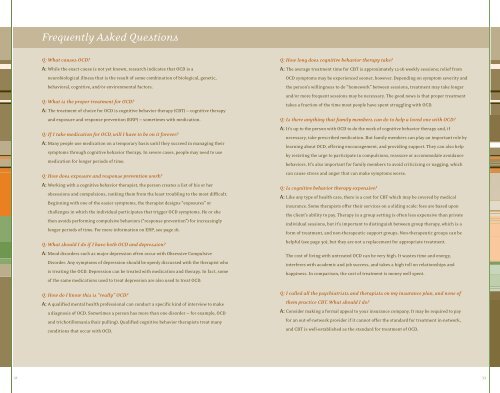Relief OCD
Relief fromOCD - Beyond OCD
Relief fromOCD - Beyond OCD
- No tags were found...
Create successful ePaper yourself
Turn your PDF publications into a flip-book with our unique Google optimized e-Paper software.
Frequently Asked Questions<br />
Q: What causes <strong>OCD</strong>?<br />
A: While the exact cause is not yet known, research indicates that <strong>OCD</strong> is a<br />
neurobiological illness that is the result of some combination of biological, genetic,<br />
behavioral, cognitive, and/or environmental factors.<br />
Q: What is the proper treatment for <strong>OCD</strong>?<br />
A: The treatment of choice for <strong>OCD</strong> is cognitive behavior therapy (CBT) — cognitive therapy<br />
and exposure and response prevention (ERP) — sometimes with medication.<br />
Q: If I take medication for <strong>OCD</strong>, will I have to be on it forever?<br />
A: Many people use medication on a temporary basis until they succeed in managing their<br />
symptoms through cognitive behavior therapy. In severe cases, people may need to use<br />
medication for longer periods of time.<br />
Q: How does exposure and response prevention work?<br />
A: Working with a cognitive behavior therapist, the person creates a list of his or her<br />
obsessions and compulsions, ranking them from the least troubling to the most difficult.<br />
Beginning with one of the easier symptoms, the therapist designs “exposures” or<br />
challenges in which the individual participates that trigger <strong>OCD</strong> symptoms. He or she<br />
then avoids performing compulsive behaviors (“response prevention”) for increasingly<br />
longer periods of time. For more information on ERP, see page 16.<br />
Q: What should I do if I have both <strong>OCD</strong> and depression?<br />
A: Mood disorders such as major depression often occur with Obsessive Compulsive<br />
Disorder. Any symptoms of depression should be openly discussed with the therapist who<br />
is treating the <strong>OCD</strong>. Depression can be treated with medication and therapy. In fact, some<br />
of the same medications used to treat depression are also used to treat <strong>OCD</strong>.<br />
Q: How do I know this is “really” <strong>OCD</strong>?<br />
A: A qualified mental health professional can conduct a specific kind of interview to make<br />
a diagnosis of <strong>OCD</strong>. Sometimes a person has more than one disorder — for example, <strong>OCD</strong><br />
and trichotillomania (hair pulling). Qualified cognitive behavior therapists treat many<br />
conditions that occur with <strong>OCD</strong>.<br />
Q: How long does cognitive behavior therapy take?<br />
A: The average treatment time for CBT is approximately 12-16 weekly sessions; relief from<br />
<strong>OCD</strong> symptoms may be experienced sooner, however. Depending on symptom severity and<br />
the person’s willingness to do “homework” between sessions, treatment may take longer<br />
and/or more frequent sessions may be necessary. The good news is that proper treatment<br />
takes a fraction of the time most people have spent struggling with <strong>OCD</strong>.<br />
Q: Is there anything that family members can do to help a loved one with <strong>OCD</strong>?<br />
A: It’s up to the person with <strong>OCD</strong> to do the work of cognitive behavior therapy and, if<br />
necessary, take prescribed medication. But family members can play an important role by<br />
learning about <strong>OCD</strong>, offering encouragement, and providing support. They can also help<br />
by resisting the urge to participate in compulsions, reassure or accommodate avoidance<br />
behaviors. It’s also important for family members to avoid criticizing or nagging, which<br />
can cause stress and anger that can make symptoms worse.<br />
Q: Is cognitive behavior therapy expensive?<br />
A: Like any type of health care, there is a cost for CBT which may be covered by medical<br />
insurance. Some therapists offer their services on a sliding scale: fees are based upon<br />
the client’s ability to pay. Therapy in a group setting is often less expensive than private<br />
individual sessions, but it’s important to distinguish between group therapy, which is a<br />
form of treatment, and non-therapeutic support groups. Non-therapeutic groups can be<br />
helpful (see page 30), but they are not a replacement for appropriate treatment.<br />
The cost of living with untreated <strong>OCD</strong> can be very high. It wastes time and energy,<br />
interferes with academic and job success, and takes a high toll on relationships and<br />
happiness. In comparison, the cost of treatment is money well spent.<br />
Q: I called all the psychiatrists and therapists on my insurance plan, and none of<br />
them practice CBT. What should I do?<br />
A: Consider making a formal appeal to your insurance company. It may be required to pay<br />
for an out-of-network provider if it cannot offer the standard for treatment in-network,<br />
and CBT is well-established as the standard for treatment of <strong>OCD</strong>.<br />
32<br />
33



